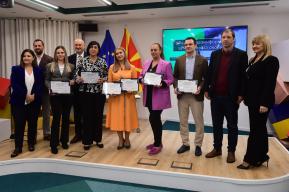News
UNESCO and EMBL invite female scientists from Africa to apply for 2024 residency in infection biology

This is the second edition of this residency programme. The first two beneficiaries in 2023 were Tendai Washaya, a 29 year-old PhD fellow from the University of Zimbabwe, and an early-career faculty, Adwoa Padiki Nartey from the University of Ghana.
This year’s successful candidates will be funded through EMBL’s Scientific Visitor Programme Office under its Infection Biology Transversal Theme.
Each of the successful candidates will be hosted by one of the five participating group leaders for this theme, based in Heidelberg (Germany), Barcelona (Spain), Grenoble (France) or Cambridge (Hinxton, UK).
Each research group at these sites is addressing a diverse set of research questions related to infection and host–pathogen interaction.
Each successful candidate will work on a project proposed by the selected group leader, as advertised on the fellowship website, and will be mentored in order to give her new skills to strengthen her own research project at home. In addition, the candidate will have the opportunity to participate in progress meetings, weekly seminars and social activities involving her research group and the wider institute, thereby expanding her professional network.
Applications are especially welcome from eligible candidates who have already been recipients of endowments from the L’Oréal–UNESCO For Women in Science programme or who are involved in the work of the Organization for Women in Science for the Developing World, a UNESCO programme unit.
This residency is offered within the framework of the memorandum of understanding signed by UNESCO and EMBL in 2022. Under this agreement, both partners undertake to promote equality, diversity and inclusiveness in science, notably by fostering implementation of the UNESCO Recommendation on Open Science adopted in November 2021, the UNESCO Recommendation on Science and Scientific Researchers adopted in November 2017 and EMBL’s Molecules to Ecosystems programme, which runs from 2022 to 2026.
Contact
For more information, please contact m.elserafy@unesco.org








